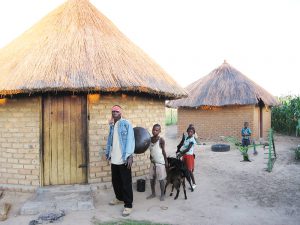
MBIRA is a non-profit organization, so why an online store? MBIRA supports Zimbabwean instrument makers and musicians through YOUR purchases! In this era when mega-corporations seem to own almost everything, you can support real people who play music and make traditional instruments in Zimbabwe by shopping in the MBIRA Store. Sale of other MBIRA Store items, such as video mbira lesson sets, t-shirts and sweatshirts, thumb picks, and Zimbabwean copper & brass bangles, help us to cover the basic expenses of the organization (web hosting, accountant, etc.).
Your online payment is processed by PayPal, and you can use a credit or debit card, or PayPal account. We do not ever have your financial information, other than how much you paid. We ship to any country in the world, so if PayPal works in your country, you can buy from the MBIRA Store.
We ship mbiras and other instruments by insured Priority Mail through the post office (or insured UPS for international shipments), packed really really well, so that you receive them in good condition and in tune. CDs and DVDs are shipped by media mail. Why is the shipping rate so high for instruments? Because we include the percentage of the entire order that PayPal takes out (before we receive your payment) in the shipping fee. Note: we do NOT know anything about import duty in your country, that is your responsibility.
A big thank you to Paul Novitski, for designing the online MBIRA Store!!!
Music
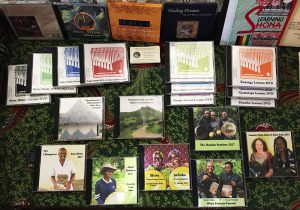
MBIRA recordings currently support over 300 Zimbabwean musicians!
Enjoy recordings of mbira players all over Zimbabwe, as well as recordings of village vocal groups with and without ngoma (drums), and a few marimba recordings. Most of the recordings are about 80 minutes long, all available as Download and some as CD. Many archival pre-2001 Download-only albums are over 90 minutes long – these are all really double albums in length! Most of these field recordings are high quality, but some of the old ones are not, so listen to the audio samples if that’s important to you.
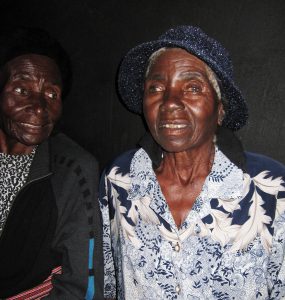
***All proceeds over minimal costs go to the Zimbabwean musicians on the recordings (or descendants for the many who have died), so PLEASE do not copy them for others. The point is to support the musicians. Trust us that almost all of the musicians on these recordings are poorer than your poorest friend – encourage your friends who like the music to support the Zimbabwean musicians, too!
“Mbira Piece Intensives” include many performances of the same mbira piece, gathered from the entire MBIRA Recordings Library. Listening to these collections helps the non-Shona mbira student to compensate for not having heard the mbira piece for many years before learning it…and supports a variety of musicians with one album purchase. It’s so interesting to hear the variety of styles and variations of a single piece! This listening is essential to learn to improvise in the traditional Shona style.
The recordings span over 60 years. Most were recorded by Erica Azim; recordings were also made in the 1980’s by Glenn “Panna” Makuna, and in the 1990’s by Brett Stewart and Todd Boekelheide; recordings made in the 1960’s and 1970’s were donated by Robert Garfias and Robert Kauffman; and a few other friends donated recordings, too. A big thank you to all of them! Contact us if you would like your recordings to be used to support the musicians, too.
Instruments – Mbiras and More
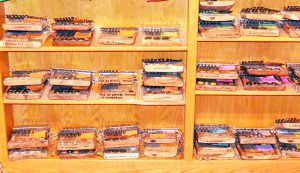
MBIRA currently supports 10 Zimbabwean mbira makers and several hosho (pair of gourd rattles) makers through selling their instruments. We also sell fiberglass dezes (mbira resonators) and magavhu (traditional leg rattles for dancers) made in Zimbabwe.
More in the Store
The MBIRA Store also offers video mbira lesson sets, books about Shona culture and language, MBIRA t-shirts and sweatshirts, and mbira accessories including thumbpicks, mbira protection bags (bubble zip bags), retso (fabric offering to mbira spirit), and copper and brass bangles traditionally worn for wrist protection.
Why a Mark-up?
We’re a non-profit, but we still have to cover our expenses.
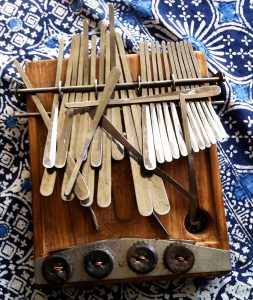
Commercial music albums only pay the musician a maximum of $1 for each copy sold, but our musicians get $12 for each copy of an album sold. $1 is taken by payment processing, and the other $7 goes toward our expenses including replacement costs for equipment used to record and process albums. We sign a simple contract with each musician or group that promises them $12 for each album sold. This is why this music is not in the iTunes store or on commercial streaming services, which pay tiny fractions of cents. In mid-2025, we started offering MBIRA Streaming from our website that continues to pay the musicians, which is our mission.
Our mark-up on mbiras is $50, which covers tuning and sanding them after their 10,000 mile journey through international mail in the poor packing materials available to the makers, updating them on the website so dimensions are correct for the current instruments in stock, and doing bookkeeping on them (including sending money to mbira makers through Western Union each month for mbiras sold).